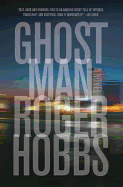Book^2: The Unconference
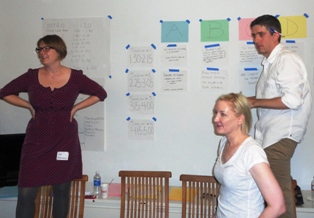 |
|
| Book^2 Camp organizers Ami Greko, Kat Meyer and Chris Kubica lay out the schedule. | |
At Book^2 (Book Squared) Camp, which took place Sunday afternoon in Workman Publishing offices in New York City, discussion topics for the "unconference" were chosen spontaneously by attendees, a diverse mix of booksellers, librarians and folks from both the print and digital publishing industries--many of them in town for this week's Tools of Change conference. In one morning session, attendees debated the merits of "closed" content models, from subscription-only access to the intentional scarcity of limited editions, as an alternative to putting everything online for free. The ability of writers to earn something for their work became a central issue; as Emily Gould, the co-founder of the digital book club Emily Books, put it, "The difference between a hobby and a business is profitability."
That theme popped up again in a later session called "Retail Zero," which asked what would happen to books if it ever came to pass that publishers and retailers decided that there was no profit to be made printing or selling books at the mass consumer level. Everyone seemed to agree there would be some people who'd still be compelled to write no matter what--but how would they support themselves? Would we see more authors competing for academic creative writing positions, or the rise of a "reading circuit" for those popular enough to attract audiences? Or would devoted readers turn to limited editions the way music collectors are willing to shell out for vinyl LPs? "If I had to pay $75 for a Toni Morrison hardcover, and that was my only choice," said one participant, "I'd have to do it."
Another discussion centered around the idea of adding a bookstore component to public libraries. One proposal was that libraries could act as showrooms, with customer orders being fulfilled by distributors. "I'd be willing to pay somewhere between full price and Amazon [for that]," someone admitted. There were, however, concerns about how political opponents might then use a library's bookselling revenues to advocate for reduced funding.
And, at the end of the day, after repeatedly circling around issues like "discoverability," somebody proposed: "What should we be talking about instead of all the stuff we talk about?" Unsurprisingly, that turned out to be a very popular topic. --Ron Hogan



SHELFAWARENESS.1222.S1.BESTADSWEBINAR.gif)


SHELFAWARENESS.1222.T1.BESTADSWEBINAR.gif)
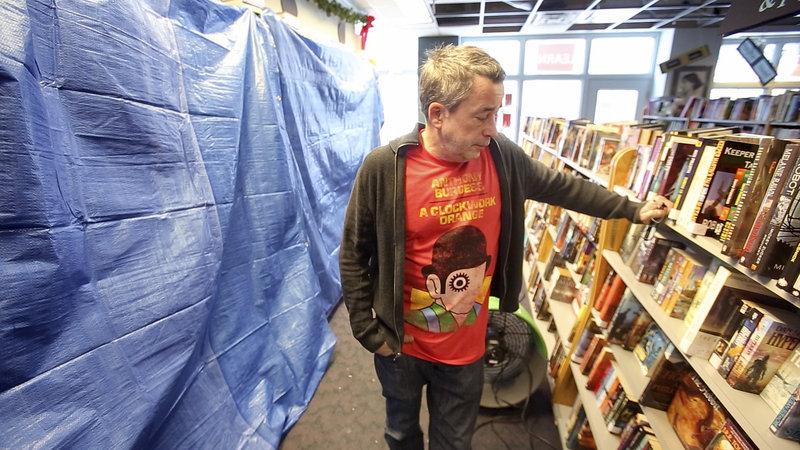
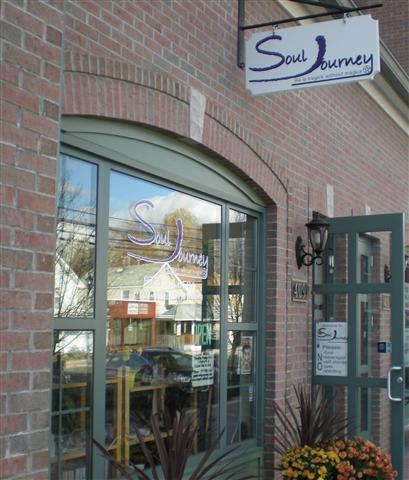 After Superstorm Sandy, Sandi Liss, owner of
After Superstorm Sandy, Sandi Liss, owner of 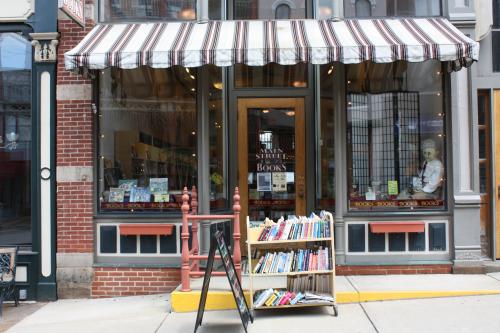 As it turned sweet 16 last Friday,
As it turned sweet 16 last Friday, 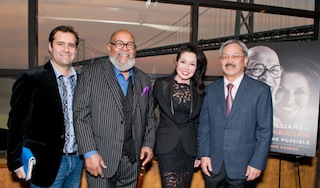 Last week HarperOne celebrated the publication of Beyond the Possible: 50 Years of Creating Radical Change in a Community Called Glide by Reverend Cecil Williams and Janice Mirkitani with a party in San Francisco. The book chronicles the transformation of the Methodist church in the city's crime-riddled Tenderloin neighborhood that Williams built up from a dying entity with only 35 congregants into a thriving church that draws thousands to its Sunday services and has created a community of acceptance, compassion and social justice. Glide, and the charismatic couple who run the church, have been at the forefront of civil rights and might be the only church where you can still get a free AIDS test during services. At the party, San Francisco Mayor Ed Lee toasted Williams and Mirikitani, saying, "We might not have won the Super Bowl, but we've got the winning team right here." HarperOne publisher Mark Tauber pointed out that it was a bit ironic to have a VIP party to celebrate a book about a community where everyone is a VIP, but he said the publisher really wanted to celebrate the book. For more about Beyond the Possible,
Last week HarperOne celebrated the publication of Beyond the Possible: 50 Years of Creating Radical Change in a Community Called Glide by Reverend Cecil Williams and Janice Mirkitani with a party in San Francisco. The book chronicles the transformation of the Methodist church in the city's crime-riddled Tenderloin neighborhood that Williams built up from a dying entity with only 35 congregants into a thriving church that draws thousands to its Sunday services and has created a community of acceptance, compassion and social justice. Glide, and the charismatic couple who run the church, have been at the forefront of civil rights and might be the only church where you can still get a free AIDS test during services. At the party, San Francisco Mayor Ed Lee toasted Williams and Mirikitani, saying, "We might not have won the Super Bowl, but we've got the winning team right here." HarperOne publisher Mark Tauber pointed out that it was a bit ironic to have a VIP party to celebrate a book about a community where everyone is a VIP, but he said the publisher really wanted to celebrate the book. For more about Beyond the Possible, 
 Planting the seed of a lifelong reading habit has taken on a literal meaning for a small public library in Basalt, Colo., that "is trying an experiment: in addition to borrowing books,
Planting the seed of a lifelong reading habit has taken on a literal meaning for a small public library in Basalt, Colo., that "is trying an experiment: in addition to borrowing books, 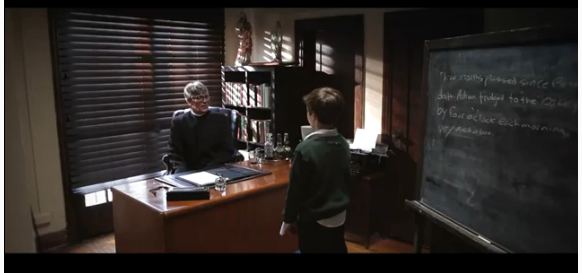 The Whipping Club
The Whipping Club Amazon's Prime Instant Video will be the exclusive online subscription home for the upcoming CBS miniseries Under the Dome, based on Stephen King's novel and produced by Steven Spielberg's Amblin Television. Under the content licensing deal, Amazon Prime members will have access to episodes of the series, which premieres June 24, four days after broadcast.
Amazon's Prime Instant Video will be the exclusive online subscription home for the upcoming CBS miniseries Under the Dome, based on Stephen King's novel and produced by Steven Spielberg's Amblin Television. Under the content licensing deal, Amazon Prime members will have access to episodes of the series, which premieres June 24, four days after broadcast.  Les Misérables, the film version of the musical based on Victor Hugo's novel, won for best supporting actress (Anne Hathaway), sound, production design and make-up & hair. Lincoln, based in part on Doris Kearns Goodwin's Team of Rivals, won a BAFTA for best actor (Daniel Day-Lewis).
Les Misérables, the film version of the musical based on Victor Hugo's novel, won for best supporting actress (Anne Hathaway), sound, production design and make-up & hair. Lincoln, based in part on Doris Kearns Goodwin's Team of Rivals, won a BAFTA for best actor (Daniel Day-Lewis).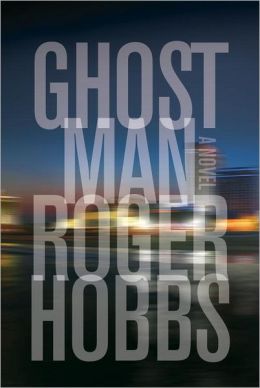 Roger Hobbs is a 2011 graduate of Reed College, where he wrote a lot and studied film. Something must have clicked for him, because his debut novel, Ghostman, a superbly written dark crime thriller, takes the reader at breakneck speed deep into the intricate world of criminals and their crimes. It's narrated by the smart, stoic Jack Delton, aka Ghostman, a fixer as meticulous and resourceful as Jason Bourne, who translates ancient texts in his down time. (His code comes from The Aeneid: "If you can't reach heaven, raise hell.") With a story told in short, James Patterson-like chapters of addictive prose that fire off like casings ejecting from an automatic weapon, it's as good a first noir as Nic Pizzolatto's Galveston.
Roger Hobbs is a 2011 graduate of Reed College, where he wrote a lot and studied film. Something must have clicked for him, because his debut novel, Ghostman, a superbly written dark crime thriller, takes the reader at breakneck speed deep into the intricate world of criminals and their crimes. It's narrated by the smart, stoic Jack Delton, aka Ghostman, a fixer as meticulous and resourceful as Jason Bourne, who translates ancient texts in his down time. (His code comes from The Aeneid: "If you can't reach heaven, raise hell.") With a story told in short, James Patterson-like chapters of addictive prose that fire off like casings ejecting from an automatic weapon, it's as good a first noir as Nic Pizzolatto's Galveston.